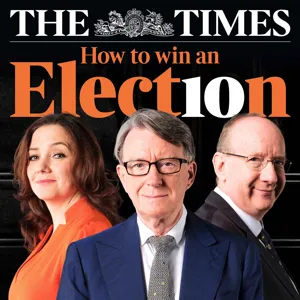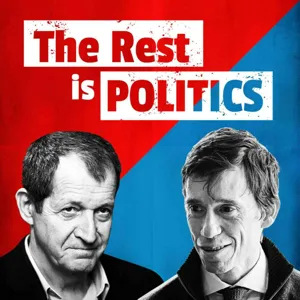Podcast Summary
Online weight loss with PlushCare and Luton Rising's community impact: PlushCare offers online access to physicians for weight loss prescriptions. Luton Rising supports jobs and charities in their community.
PlushCare offers a convenient and effective way to begin your weight loss journey with online access to board certified physicians who can prescribe FDA approved medications for those who qualify. Elsewhere in the discussion, it was mentioned that Luton Rising, the owners of London Luton Airport, have a significant social impact in their community by supporting thousands of jobs and charitable contributions. In the realm of politics, the panel discussed the potential risks and benefits of politicians publicly stating their views on economic recovery. Ultimately, it was agreed that the accuracy of the statement is more important than the political correctness of timing. Additionally, the hosts joked about their own attempts to go viral and encouraged listeners to reach out with their thoughts.
Align economic messaging with public perception: Effective economic messaging depends on public's economic perception, using relatable metaphors and reflecting reality
Rishi Sunak's economic messaging during his campaign should align with the current state of the economy. If the economy is improving, he should emphasize this to win voter support. However, if the economy is not doing well, it would be more effective for him to wait for things to improve before making optimistic statements. The public's perception of their own economic situation is crucial, and the Prime Minister cannot force them to view the economy differently. The use of relatable metaphors, such as agricultural ones, can be an effective way to engage the audience and tailor economic messages to their understanding. The shift in polling numbers in areas with high NFU membership indicates a directional change, but it's essential to be cautious about economic optimism in the face of potential statistical surprises. Ultimately, the Prime Minister's economic messaging should reflect the public's perception of their economic situation to be effective.
Economic recovery might not be enough for Tories to win votes: Complex political landscape, ongoing spending cuts, potential tax increases, parties capitalizing on each other's missteps, parliamentary rules limiting debate, careful navigation needed for success
The economic recovery, if it exists, may not be enough for the Conservative Party to win votes in the upcoming election, especially with ongoing public spending cuts and potential tax increases. The political landscape is complex, with parties trying to capitalize on each other's missteps, such as the recent Gaza ceasefire vote debacle. The parliamentary rules, designed for a binary political system, can limit meaningful debate and create opportunities for self-inflicted wounds. Ultimately, political success requires careful navigation of complex issues and public sentiment.
UK Parliament debate on Gaza lacked clarity due to party infighting and conflicting amendments: The recent UK parliament debate on the Gaza conflict lacked intellectual focus and failed to provide a clear path forward due to political pressures and conflicting amendments from various parties.
The recent debate in the UK parliament regarding the conflict in Gaza resulted in more confusion than clarity due to the various amendments proposed by different parties. The Labor Party's amendment calling for both an immediate ceasefire and certain conditions to be met led to further complexity, as achieving both is impossible. While there may be instances where considering a third option could benefit parliament, this particular debate lacked intellectual focus and was hindered by political pressures and party infighting. The situation in Gaza is complex, with valid arguments on both sides regarding Israel's right to self-defense and the need to avoid causing unacceptable civilian casualties. The procedural shenanigans during the debate were a distraction, with the Scottish Nationalists more focused on scoring points against Labor than finding a solution for the Palestinians. Ultimately, the debate failed to provide a clear path forward for addressing the crisis in Gaza.
Parliamentary Procedures: A Means of Accountability: Parliamentary procedures expose political divisions and hold leaders accountable, even during complex debates on Brexit and Palestine.
The seemingly petty procedures and debates in parliament serve an important role in holding politicians accountable and exposing divisions within parties. Speaker of the House of Commons, Lindsey Hoyle, found himself in a procedural quagmire during a recent debate, but the importance of these procedures was emphasized by the interviewee. They argued that the complexity of issues like Brexit and Palestine make it difficult to present clear, black and white positions, and traditional parliamentary procedures can bring out the worst in political leaders. However, the interviewee also acknowledged the SNP's right to expose Labour's stance on these issues and the potential implications for a future Keir Starmer-led government. Despite disagreements on specific issues, the importance of parliamentary procedures as a means of accountability was a common thread throughout the conversation.
Celebrating Mother's Day with 1-800-Flowers and Expressing Gratitude: Express gratitude to mothers during Mother's Day with special offers from 1-800-Flowers on bouquets, treats, food, and unique gifts. In politics, Rishi Sunak should distance himself from Liz Truss's controversial associations and statements to strengthen his position.
During Mother's Day, it's essential to express gratitude to the selfless mothers in our lives. 1-800-Flowers offers various ways to celebrate with handmade bouquets, sweet treats, gourmet food, and unique gifts, with up to 40% off Mother's Day bestsellers at 1800flowers.com/acast. Meanwhile, in politics, there's a debate about how Rishi Sunak, the current UK prime minister, should handle Liz Truss, a former cabinet member. Truss has been associating herself with controversial figures and making questionable statements, which could create problems for Sunak if he doesn't clearly distance himself. The situation is particularly concerning since Truss once admired pro-establishment figures like Roy Jenkins, but now appears to align with far-right figures like Steve Bannon. Sunak could potentially strengthen his position by publicly criticizing Truss's recent actions and positioning himself as a clear departure from her policies.
Rishi Sunak's Unclear Leadership and Liz Truss's Controversial Policies: Rishi Sunak's failure to define himself and distance from past ideologies led to lack of support, while Liz Truss's controversial policies and inflammatory language hindered effective governance and trust.
Rishi Sunak's failure to clearly define himself and distance himself from the past conservative thinking and right-wing ideologies during the beginning of his premiership led to his inability to gain support from the public and his own party. His attempt to appease both the activist base and the country as a whole resulted in a lack of direction and unity within his leadership. The public's disapproval of Liz Truss's premiership and her association with controversial policies and ideas highlights the importance of clear and decisive leadership. Sunak's hesitance to make big strategic choices and silence dissenting voices has hindered his ability to effectively govern and gain the trust of the nation. The use of inflammatory language and conspiracy theories, such as referencing a "deep state," only further undermines the credibility of political leaders and hinders productive discourse.
The Conservative Party's Crisis of Ideology: The Conservative Party in the UK is facing an existential crisis due to confusion over ideology, with potential right-wing defections to Reform UK or similar parties. The outcome of the upcoming election could determine the party's future direction.
The Conservative Party in the UK is facing an existential crisis due to its confusion over ideology, with the possibility of a significant right-wing faction leaving to join Reform UK or other similar parties. This crisis is more serious than just internal party chaos, as there is a growing trend towards populist, protectionist policies both in the UK and potentially in the US. Keir Starmer's decision to expel hard-left and anti-Semitic members from Labour has left them with fewer viable alternatives, but for the Conservatives, there is Reform UK and other potential contenders. The Conservative Party's inability to define its position on economic policies, such as free trade versus protectionism, is contributing to this crisis. The outcome of the upcoming election could determine the future direction of the Conservative Party, potentially leading to a fight for its very soul.
Making tough decisions in politics: Political leaders may need to remove high-profile members for strategic reasons, but it's crucial to consider potential risks and consequences, and strike a balance between unity and principles.
Political leadership involves making tough decisions, even if it means losing some support. In the context of the ongoing situation in the Conservative Party, the discussion suggests that removing a high-profile member like Liz Truss from the party could be a strategic move to reclaim territory and draw a line. However, it's important to consider the potential risks and consequences, such as the possibility of fragmenting the party further. Ultimately, the decision rests on the political strategy and the grounds for removal. While some may argue that Truss's controversial statements and actions provide ample reason, others may view it as a weak move. The key is to strike a balance between maintaining party unity and standing firm on principles.
Demarcating oneself from controversial figures and focusing on all seats: Parties must clearly distinguish themselves from divisive figures to protect their election prospects. All seats, regardless of perceived winnability, should be taken seriously due to potential shifts in voter sentiment and unexpected election outcomes.
Drawing a clear line and expressing demarcation between oneself and a controversial figure, especially in the context of an election, is crucial. This was discussed in relation to Rishi Sunak and Boris Johnson, as Johnson's association with Steve Bannon and his controversial views could potentially harm Sunak's election prospects. Another key point raised was the importance of parties putting effort into seemingly unwinnable seats, as there may be a shift in voter sentiment and unexpected outcomes. Andrew's question highlighted the dilemma of whether to invest resources in such seats or leave the incumbent in place to potentially add to the chaos if the party loses the election. Peter's experience of observing growing anger towards the government and the sitting MP in his constituency underscores the need for parties to take all seats seriously and not write them off as unwinnable. The potential for a sea change election was emphasized, making it essential for parties to reassess their strategies and priorities.
Making strategic decisions about election seats: Parties must prioritize resources in winnable areas and make informed decisions about where to allocate them, considering both practical and emotional factors. Quality and ethical practices are essential in election campaigns.
Focusing resources in winnable areas and making strategic decisions about which seats to prioritize is crucial in elections. However, determining which seats are worth the investment and which ones are not can be challenging, both practically and emotionally. Parties make last-minute decisions to persuade activists and prevent candidates from winning in specific seats. Historical examples, such as the Liberal Democrats' expansion in 2010 and their attempt to defend too many seats in 2015, illustrate the importance of making informed decisions about where to allocate resources. Candidates can significantly impact a party's reputation, so it's essential to take every seat seriously and ensure proper preparation, even if it's not considered a winnable one. Quality is also nonnegotiable when it comes to election campaigns, and partners like Quince can help elevate a campaign's style without the high price tag, while maintaining ethical and responsible manufacturing practices.






